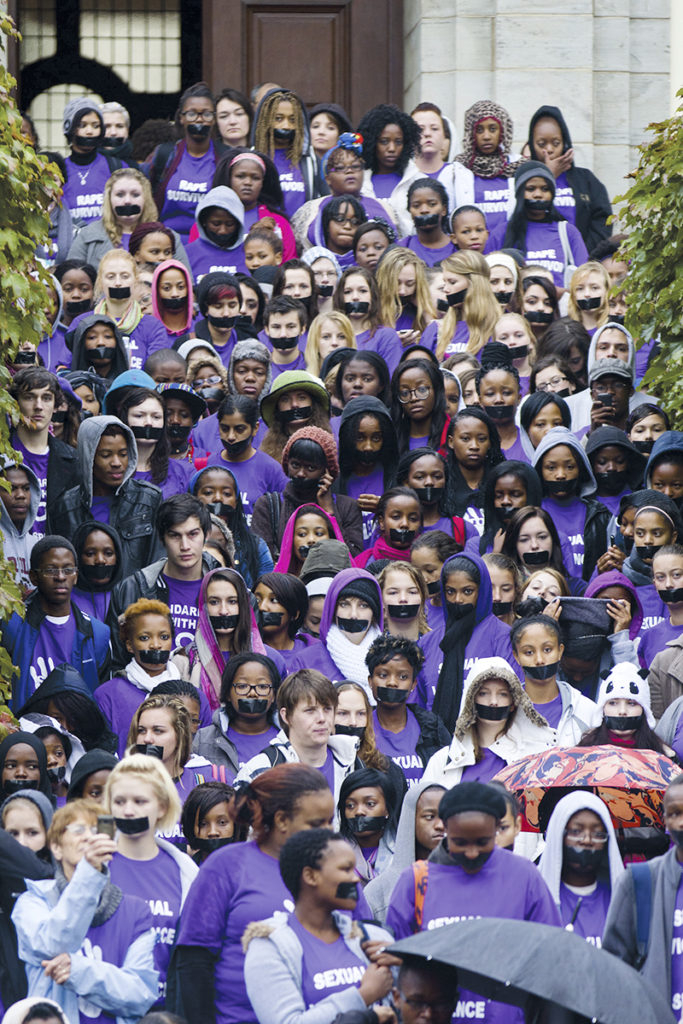Rhodes University will be the Eastern Cape venue for the 10th annual Silent Protest on Friday 11 August 2017.
Thousands of students will be gathering on campuses in Grahamstown, Durban and Cape Town during August – Women’s Month – to participate in the annual Silent Protest – showing solidarity with rape survivors and fighting for their right to Post Exposure Prophylaxis (PEP).
The first Silent Protest was initiated at Rhodes University in Grahamstown in 2007. This year marks the fourth year that the Aids Healthcare Foundation (AHF) has organised the protests as part of the organisation’s campaign to reduce new infections in young women and girls, and the 10th anniversary of the Silent Protest in Grahamstown. The main objective of the Silent Protest is to highlight the serious issues surrounding rape and sexual violence as well as the difficulties its’ survivors face after the crime.
“Rape, sexual assault and child abuse remain a far larger problem than even the frightening SA crime stats provided by SAPS indicate,” said Larissa Klazinga, Regional Policy and Advocacy Manager for AHF Southern Africa. “The issues which inspired the protest a decade ago persist, with victim-blaming and stigma remaining the order of the day.
“The public needs improved education on PEP and how to access it,” Klazinga said. “We are working with universities as a way of empowering our future leaders to break down the social stigma attached to rape, working with them to combat victim-blaming and secondary victimisation.”
Other factors contributing to the silence of rape survivors will also be highlighted at the event: the silencing nature of the act itself; the fact that the survivor is intimidated by the suspect; they fear not being believed; being blamed and shunned by their community; and being interrogated, re-traumatised, labelled, pitied and stigmatised.
“AHF is particularly concerned that access to treatment is still denied to victims unless they report the incident to the police. This practice continues despite clear guidelines being set out in national legislation and policy, released in 2015, regarding the dispensing of PEP to rape survivors. There is a critical need for improved training for healthcare workers dealing with rape survivors,” said Hilary Thulare, AHF South Africa Country Programme Director.
The Silent Protest 2017 will take place on the following campuses:
· 11 August – Rhodes University, Alec Mullins Hall
· 16 August – Durban University of Technology
· 29 August – University of Cape Town
Each Silent Protest itinerary will include a morning briefing, symbolic silencing, march, die-in and an open mic session to end the protest, allowing participants to break the silence about gender-based violence.
How bad is it?
Crime statistics for rape and gender-based violence are largely unreliable, though more than 50 000 rapes were reported to the South African Police Services last year.
The average rape case takes four years from reporting to sentencing and only 6.5% of reported cases will be successfully prosecuted. Less than half of 1% of perpetrators will serve any jail-time.
All recent studies agree that the vast majority of rape victims never report the crime to the police and there are many statistics available focusing on the ratio of reporting to non-reporting of rape survivors: the most conservative estimate comes from Rape Crisis (1 in 4) and the most shocking comes from the SAPS (1 in 25). These statistics translate to anywhere from 260 000 to over 1.5 million rapes annually.
“Tragically, violence against women, children, the gay and lesbian community and trans people continues unabated and remains a key driver of new HIV infections in South Africa,” Klazinga added.
Professor Lillian Artz of the Gender, Health and Justice Research Unit explained that “…low conviction rates, lengthy court cases and victimisation breed a culture of impunity, where sexual offenses are commonplace and where there is a well-founded belief that there will be no consequence for this crime.”
“The campus protests in August affirm our solidarity with millions of victims silenced by sexual violence, not only on our campuses and in our communities but in our country as a whole. South Africa may have progressive laws and policies, but rape culture, patriarchal and heteronormative beliefs, values, norms and attitudes as well as wide-spread misogyny render these laws meaningless in the lives of rape survivors”, said Lindsay Kelland, acting Director of the Allan Gray Centre for Leadership Ethics at Rhodes University.
www.aidshealth.org
Facebook @aidshealth.org
Twitter and Instagram: @AIDSHealthSA



